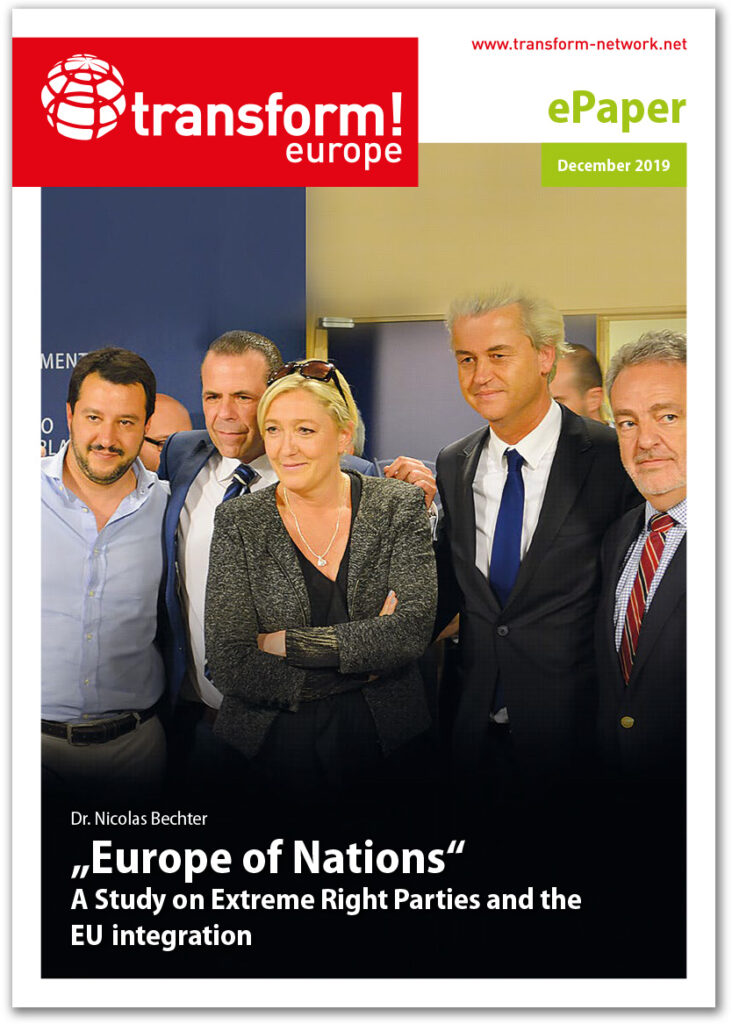The EP elections brought a strengthening of extreme-right parties. This paper takes a closer look at the party manifestos for the elections to the European Parliament of five of those extreme-right parties by comparing their positions towards the EU, EU integration and „Europe“ in general.
Please find the ePaper on the left/below (mobile version) in ‘Documents’ (English, PDF).
Between May 23rd and May 26th the elections to the 9th European Parliament are held throughout the 28 member states of the European Union to select 751 MEPs, which represent almost half a billion people. The Brexit-situation will certainly make this election special, but another aspect is at the center of this analysis: an expected strengthening of extreme right parties and subsequently a closer collaboration of these parties in the form of a new parliamentary group called European Alliance of Peoples and Nations (EAPN), which was presented by Matteo Salvini and others on April 4th in Milan. Given that one defining aspect of the extreme right is nationalism, one could assume that the possibilities of collaboration are rather limited due to chauvinism and petty self interests. But there has been considerable effort in the recent years to unite the various parties: On the level of the European Parliament by forming common parliamentary groups, but also on other institutional and personal levels. This paper takes a closer look at the party manifestos for the elections to the European Parliament of five of those extreme-right parties by comparing their positions towards the EU, EU integration and „Europe“ in general.
Five parties of the extreme-right were selected for this study:
- The Dansk Folkeparti (Danish People’s Party – DPP)
- The Dutch Partij voor de Vrijheid (PVV)
- The German Alternative für Deutschland (AfD)
- The Italian Lega
- The French Rassemblement National (RN)
As this selection seems arbitrary on first sight, it is necessary to make some comments on the selection. First of all, the study does not claim to give a comprehensive or complete overview over extreme-right parties in Europe. There is a lot of literature from political science that covers this field. Furthermore, the study does not claim to give a full picture of the ideology of the parties in question. The study focuses only on the ideological positions of the parties towards Europe, European integration, the EU etc. The sources for the study will be the manifestos for the elections to the European Parliament, general party manifestos, if the former are not available, or programmatic speeches if neither exists. The party programs vary enormously in terms of scope and detail: The AfD’s party program for example has 190 pages and the party additionally adopted a 88 page special campaign manifesto for the EU-elections. The PVV on the other hand has a party manifesto of half a page and no special campaign manifesto. This makes it necessary to include programmatic speeches in the study, as otherwise comparisons would hardly be possible.
This is just one aspect of different traditions and different political cultures that have to be considered when analyzing the manifestos along with the characteristics of the respective political systems and political and cultural traditions.
Furthermore, it has to be noted, that the idea of Europe can be filled with different meanings. The EU itself and most of the big mainstream parties tend to equate Europe and the EU. This includes a commitment to western democratic systems, a (neo-)liberal economic and social order and an ever deeper integration of the states into the Union. Thus most parties of the extreme right, simply rejected this idea of Europe. But, recently a change can be observed. Following Matteo Salvinis efforts to create a new right-wing parliamentary group after the elections, the rhetoric shifted from being anti-European to a change from within. In this sense in the eyes of the extreme right the EU becomes the usurper of the idea of Europe and the right-wing parties are the true defenders of Europe. This understanding of Europe is however not completely new, but builds on intellectual traditions from fascist and national socialist ideologies, that allegedly defended Europe against the “Jewish-bolshevist hordes of the east”. Ideas of Europe often included anti-semitism, colonialism and nationalism. Also in the late 1960s French neo-fascist Nouvelle Droite circles developed ideas of a “new order for Europe”, that can now be found in extreme right propaganda narratives as the allegedly necessary defense of Europe.
